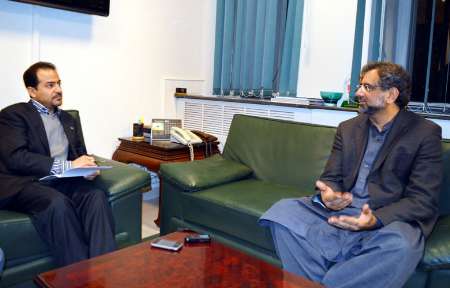In an exclusive interview with IRNA in Islamabad, the official expressed views of his respective government on energy cooperation with Iran. The text of Pakistani federal minister's comments follows.
** IP gasline
To a question on completion of the Iran-Pakistan gas pipeline, he replied:
“We need the gas, we want the gas we are committed to the project and now we are putting money in it also. Before that we had spent 50, 60 million dollars, now there is full commitment to the project. Nobody should have any doubts.
The issue is that Pakistan and Iran are neighbors, and you are talking about one pipeline. I am talking about three pipelines, it is good that you have a neighbor which is the second largest owner of gas reserves in the world. It is natural that you should import the gas from that country, gas is a cheap fuel, clean fuel, it can easily be transported, and Pakistan is a very old gas country, we have extensive gas network, even villages have gas, industries are on gas, fertilizers are on gas, so we need gas. What I am saying is, in future I see not this just one pipeline, but I see three or more pipelines from Iran.
So we went through different ways to develop the project and what we did was that we have signed an understanding with the Chinese company and this is part of the Gwader project also, we will build an LNG terminal at Gwader and pipeline would be built from Gwader to Nawabshah of 700 kilometers, so that leaves about 70 kilometers to be constructed to Iran border.
The agreement with China is being negotiated now. We are very hopeful about the contract. I personally went to China and held high level meetings with them, they are interested in the project but these things always take time, it cannot happen in one day or one week, we are working on it since last August. I am hopeful that within 6 months you will see construction activity and will be completed in 18 months because they can do it very faster than the other contractors.
Normally such kind of project takes three years to complete. The other more than 70 kilometers of the project to the Iran border will be done by our own companies. They are doing the planning now and they will be mobilized very soon. The construction will start earlier than the Gwader-Nawabshah portion of the pipeline.
We have explained it to Iran that we will build the project. ISGS and NIOC (Pakistani and Iranian companies that have signed the agreement) people will meet soon. The meeting is planned for the third week of January but I have asked them to do it earlier if possible.
We need the gas, we want the gas we are committed to the project and now we are putting money in it also. Before that we had spent 50, 60 million dollars, now there is full commitment to the project. Nobody should have any doubts.'
** TAPI project
Also answering a question on the Turkmenistan-Afghanistan-Pakistan gasline project he said:
'TAPI project was moving very slowly but in the last meeting in Ashkhabad there was a resolution of the major issues and now the next ministerial meeting would be held in Pakistan in the month of February and it is good that we have started moving now. We are not satisfied with the pace of the project. But when there are four countries involved and there are security concerns then things move a bit slowly.
TAPI and IP are two different projects, Iran is our contractual commitment, but TAPI is not a contractual commitment. We have also invested money in the IP project, now we will invest more money in the project. We need gas and we are committed to the IP project. The only constraint has been the sanctions.'
** Low prices in Pakistan interest
When asked about the effect of declining oil prices on Pakistan's economy, he observed:
'Whenever the prices go down the consuming nations have advantage and the producing nations have disadvantage and it’s a cycle, so at the end of the day it evens out. Personally I feel there is a disadvantage also because when the oil prices are down, some economies may shrink because the producing nations will not spend enough money so in some exports there could be a problem, so again this is a situation where the oil prices are trying to find out their natural level of pricing.'
** Reasons for low oil prices:
Khaqan Abbasi also shared his views on the factors behind the plummeting prices of oil:
'The general impression is that market situation has driven the prices down. The lower demand and the shrinkage in the Chinese market and some other major markets is another reason. But lower prices impacts everybody. It will impact US economy, European Economy. It will impact the Middle Eastern economy. It will also impact Russia in a big way and Russia is suffering at the moment as we can see. It will impact the economy of Iran, and some people have this opinion that it is more of a political decision than perhaps an economic decision. I would say part of it is politically motivated; there is always a political element.
There are major players who can affect the oil price and oil price is going down , there have been no production cuts by anybody so far, but it’s more of an economic issue than political issue, but political element is definitely there.'
**9060**1377

Islamabad, Jan 3, IRNA - Pakistan's Minister for Petroleum and Natural Resources Shahid Khaqan Abbasi says his energy hungry country has invested heavily in importing gas from Iran and is ready to triple the existing gasline agreement with the neighboring oil-rich Iran.

